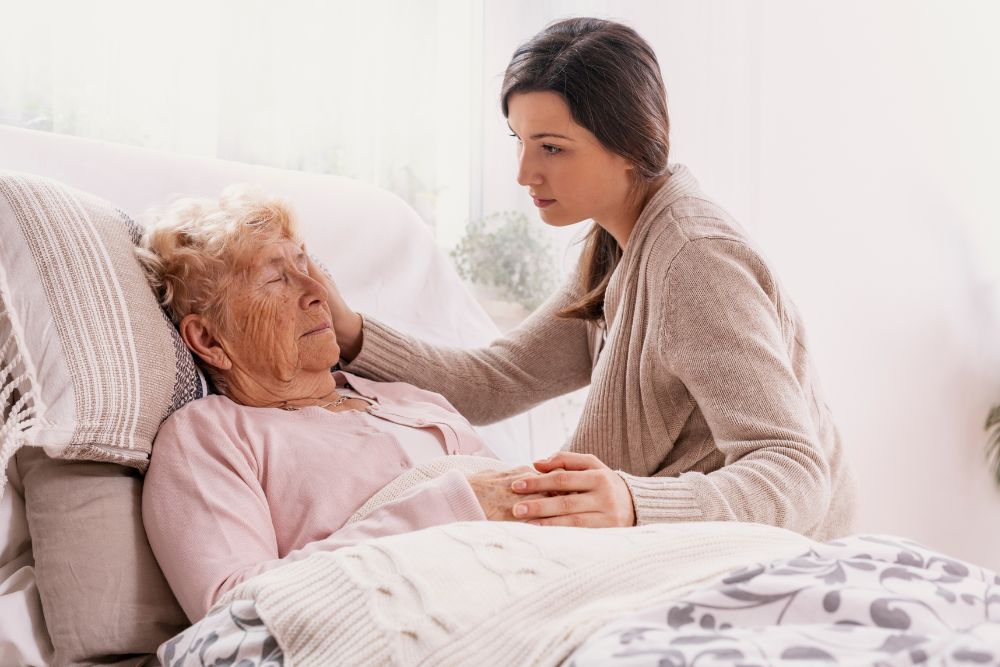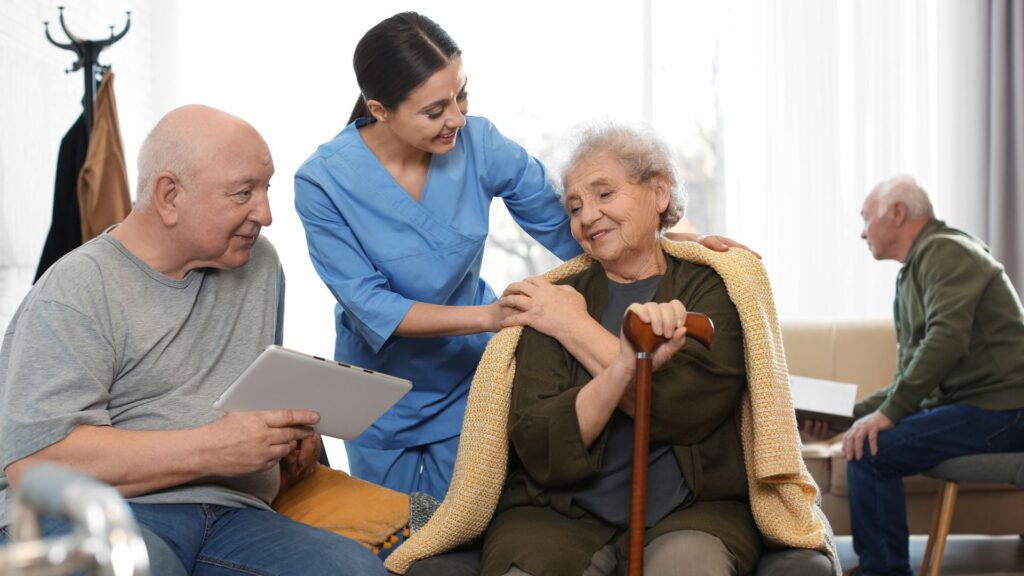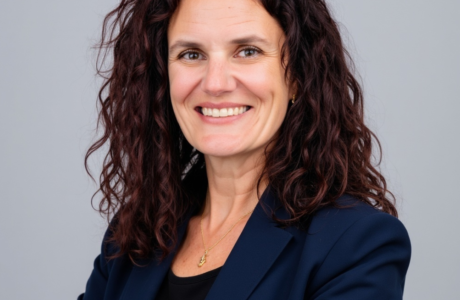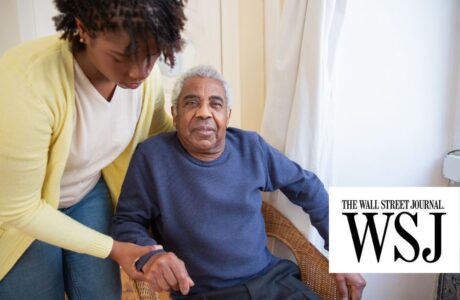
Who Supports the Supporters? How Families Can Heal Together
Navigating the end of life journey is never a solo act. Whether you’re a parent, partner, adult child, or friend, the weight of caregiving and loss does not fall on just one pair of shoulders—it ripples through the entire family. While most conversations around illness and grief focus on the person who is dying, fewer talk about what happens to the rest of us.
This guide explores the emotional and practical challenges families face during end of life care. You’ll learn how to recognize caregiver burnout, avoid common post hospitalization myths, talk to children about death, and choose in-home care services that nurture the whole family. With trauma informed guidance and expert backed insights, this is your roadmap for navigating this sacred and difficult chapter together.

Family Support During End of Life Care: What to Expect and Why It Matters
Family support means more than offering a shoulder to cry on. It involves communication, shared decision making, and honoring the needs of everyone involved—patients, caregivers, and loved ones. Studies show that families with strong support systems experience less distress, more satisfaction with care, and a smoother grieving process.
At Empowered Endings, our Family Support program offers concierge care for every stage of the journey. We help you:
- Navigate difficult conversations
- Clarify medical decisions and legacy wishes
- Manage burnout and emotional overwhelm
- Heal fractured relationships
Support should be reciprocal. Everyone in the system benefits from compassionate care.
Caregiver Burnout: Signs, Symptoms, and Support That Helps
Caregivers often carry the invisible weight of being the strong one. They manage medications, appointments, financial logistics, and emotional fallout—often while neglecting their own well being. Without support, caregiver burnout can slowly take over.
Common signs of caregiver burnout include:
- Physical exhaustion or chronic fatigue
- Sleep problems or appetite changes
- Increased irritability or emotional numbness
- Guilt for taking breaks
- Feeling resentful, helpless, or trapped
These signs are signals that you need support and replenishment.
Steps to find relief:
- Talk to a counselor or grief informed therapist
- Join a caregiver support group (online or in person)
- Delegate tasks to trusted friends or relatives
- Consider professional in home care services
Even a short break can help you return with more energy and compassion.
Support After Hospital Discharge: What Families Need to Know
Whether your loved one is coming home from surgery, the ICU, or a serious diagnosis, the days following a hospital discharge are often the most crucial. Yet many families are left to figure things out without a clear plan.

Here are seven common myths that can cause avoidable stress:
Myth 1: The hospital arranged everything
Discharge teams provide basic instructions, but the family is typically responsible for coordinating follow ups, medication pickups, and home setup. Always ask for timelines and specific next steps.
Myth 2: We don’t need help yet
Families often wait until they feel overwhelmed to seek support. But early access to palliative or family care services can help ease the transition.
Myth 3: The home is already safe
Falls, missed medications, and misplaced supplies are common risks. Walk through the home and set up necessary safety equipment and reminders.
Myth 4: One person can handle it all
Caregiving works best as a team effort. Relying on one person to manage care alone can lead to burnout and health issues.
Myth 5: Emotional strain will go away on its own
Grief, fear, and frustration are common post discharge. Naming these feelings and getting support can prevent long term emotional stress.
Myth 6: Kids don’t need to be involved
Children sense stress and change. Involving them in age appropriate ways can build resilience and emotional connection.
Myth 7: We have plenty of time to make decisions
The post hospital phase moves quickly. Having difficult conversations now can prevent regret later.
The fear of doing it wrong or missing the chance to say goodbye weighs heavily on many families. Planning ahead brings peace of mind and reduces emotional strain.
What Is the Role of a Palliative Social Worker in Family Care?
Palliative social workers are essential members of the care team. They provide emotional support, coordinate logistics, and advocate for both patients and their families. After a hospital discharge, they can help families navigate new medical needs, home adjustments, and long term care options.
Their role often includes:
- Facilitating care conferences with the medical team
- Helping families make complex decisions under stress
- Providing resources for financial and emotional support
- Mediating family dynamics when conflict or confusion arises
By offering a calm, compassionate presence, palliative social workers empower families to move forward with greater clarity and confidence.
Complicated Grief in Families: Signs to Watch and How to Support
While many people experience grief in waves, some become stuck in it. Complicated grief is a prolonged, intense response to loss that interferes with daily life. It can show up in unexpected ways—especially in family members who try to stay strong or avoid their feelings.
Common signs of complicated grief include:
- Persistent yearning or fixation on the deceased
- Avoidance of reminders or refusal to accept the death
- Emotional numbness or detachment from others
- Ongoing anger, guilt, or hopelessness
Children, teens, and spouses are especially vulnerable. If someone in your family shows these signs weeks or months after a loss, it may be time to seek professional support. Early intervention helps prevent long term emotional strain and strengthens family resilience.
You could deepen credibility by referencing research-backed grief resources like the Dual Process Model of Grief or Dr. Katherine Shear’s work on Prolonged Grief Disorder if you choose to expand.

Family Grief Therapy and Decision Making: How to Communicate Without Conflict
End of life decisions can be emotionally charged. But family meetings offer a structured, compassionate space to share perspectives and make care plans together.
Tips for effective family meetings:
- Choose a neutral time and place with minimal distractions
- Set a clear goal for the meeting (e.g., discuss care options or legacy wishes)
- Allow each person to speak without interruption
- Use “I” statements to express feelings and preferences
- Consider inviting a facilitator such as a chaplain, social worker, or counselor
Not everyone will agree, but clear communication can prevent misunderstandings and foster mutual respect. Decisions made together often lead to more peace and fewer regrets.
How to Talk to Kids and Teens About Death: Scripts and Emotional Support
Children often pick up on tension and change, even when adults try to protect them. Talking about death openly and age appropriately can help children feel safe and included.
For young children (ages 3–7): Use concrete and gentle language.
“Grandma’s body stopped working, and she isn’t coming back. But we can still remember her together.”
For school aged children (ages 8–12): Let them ask questions and share their feelings.
“It’s okay to feel upset. I feel that way too. We can talk about it anytime.”
For teens: Give space for independence while remaining available.
“You don’t have to talk about it if you don’t want to. But I’m here whenever you do.”
Offer ways to process grief through drawing, storytelling, or creating rituals. Children and teens may revisit grief as they grow, so keep the door open.
How to Choose In Home Care Services That Support the Whole Family
In home care can transform the environment from clinical to comforting. The right care team provides more than just medical support—they help the entire family find peace and clarity.
Look for services that offer:
- Symptom management and medication coordination
- Emotional support for caregivers and loved ones
- Legacy projects or spiritual rituals
- Support through transitions and farewells
Ask the care team:
- Do they facilitate family meetings or offer counseling?
- Are they trained in trauma informed approaches?
- Will they honor cultural traditions and spiritual beliefs?
Empowered Endings provides in home care designed to support both the dying and those who love them. Our team offers gentle guidance through every phase.
Grief Support for Families: How to Navigate Loss Together
Grief doesn’t occur in isolation. When someone becomes ill or passes away, the whole family feels it—emotionally, mentally, and sometimes physically. These shifts can bring up old wounds or deepen connections.
Ways to support each other through grief include:
- Sharing stories or photos that celebrate the person’s life
- Allowing each member to grieve in their own way
- Attending group counseling or grief circles
- Creating space for silence, reflection, and gentle presence
Families are living systems. When one part is hurting, the others can offer strength, patience, and support.
If you’re navigating caregiving, grief, or the transition home after a hospital stay, you don’t have to do it alone. Empowered Endings offers Family Support services tailored to your emotional, practical, and spiritual needs.
Explore our in home care and grief support options, and join our newsletter for expert guidance and heartfelt resources.
You’ll also receive our free e-book, Exploring Your End of Life Options designed to help you feel more prepared and supported every step of the way.
When families are supported, the path forward becomes clearer, calmer, and more connected.





